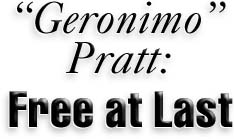


t the height of the Vietnam War a helicopter crashed with five soldiers trapped inside who were about to become five more statistics. Fate intervened when a young American paratrooper in a protected position nearby jumped into action.
|
Sergeant Elmer “Geronimo” Pratt did what few would have the courage to do: he raced to the flaming wreck and, one by one, carried the five wounded men to safety, all the while exposed to the possibility of enemy fire and the chance that the fuel tanks might explode, ripping him and the helicopter to shreds.
Three decades after Pratt left Vietnam with a chestful of medals for his bravery, he emerged from prison in his homeland as a different kind of hero—a man who had maintained his dignity, integrity and respect for his fellow man through 27 years of imprisonment for a crime which overwhelming evidence shows he did not commit.
Although his court-ordered release in June 1997 was long overdue, it was still, in the words of one of his friends, “a good day for America.”
After returning from his second tour in Vietnam and enrolling as a student at UCLA in 1967, Geronimo Pratt became interested in the rights and welfare of black citizens, volunteering to help community efforts that provided breakfast programs for children, conducted clothing giveaways and furnished transportation for students.
At the same time, he became increasingly aware of prejudicial treatment and harassment of blacks at the hands of some law enforcement officers and certain sectors of government. Roughly a year later, after a pivotal incident—the shooting of a small black child who had allegedly stolen a candy bar—he joined the Black Panther Party.
Although he didn’t know it at the time, he had entered something even more dangerous than a burning helicopter: the quagmire of lies, betrayals, secret informants, dirty tricks, arson and murder that was COINTELPRO—the domestic counter-intelligence program laid out under the direction of then FBI director J. Edgar Hoover.
As described in a series of Freedom articles, evidence—including FBI records and eyewitness accounts—showed that Pratt had been framed for a December 1968 murder on a Santa Monica, California, tennis court while he was some 400 miles to the north, meeting with other black leaders. Pratt was fingered for the crime in 1970, after he became the leader of the Los Angeles chapter of the Panthers.
“There is no question whatsoever that Pratt was framed for the murder,” the author of FBI Secrets, M. Wesley Swearingen, a 25-year FBI agent, said. “Pratt was in Oakland when it happened. He was set up.” Swearingen stated that the FBI knew three wiretaps existed which placed Pratt in Northern California before, during and after the so-called tennis court murder, but the bureau withheld this and other vital information from the court and the jury which would have absolved Pratt.
By coming forward, Swearingen helped to tip the scales against the injustice that had kept Pratt behind bars. Others were also instrumental, including Stuart Hanlon, the relentless San Francisco attorney who devoted 23 years to seeing the conviction overturned; Johnnie Cochran, whose forceful arguments left no doubt that the prosecution’s case was not only full of holes, but lies and deceit as well; and James McCloskey of the Princeton-based Centurion Ministries, whose impartial review of the facts corroborated what Pratt had shouted to the jury after it declared him guilty in the summer of 1972: “You’re wrong. I didn’t kill that woman.”
And through the years, Swearingen pointed out, certain news media, including Freedom, the Los Angeles Times and the San Francisco Chronicle, kept the issue of injustice in Pratt’s case before the public eye.
When the matter was recently reviewed by Superior Court Judge Everett W. Dickey, the facts came through loud and clear: the prosecution had suppressed vital evidence and Geronimo Pratt never received a fair trial.
And so it was that a man whose spirit could not be broken by 27 years in prison—many of them under severe hardship in solitary confinement—stepped into the light of freedom on June 10, 1997, with words of peace, not bitterness. The 49-year-old former paratrooper was greeted by hundreds of well-wishers, one of whom invoked words once quoted so famously by Martin Luther King Jr.: “Free at last! Free at last! Thank God Almighty, he’s free at 

